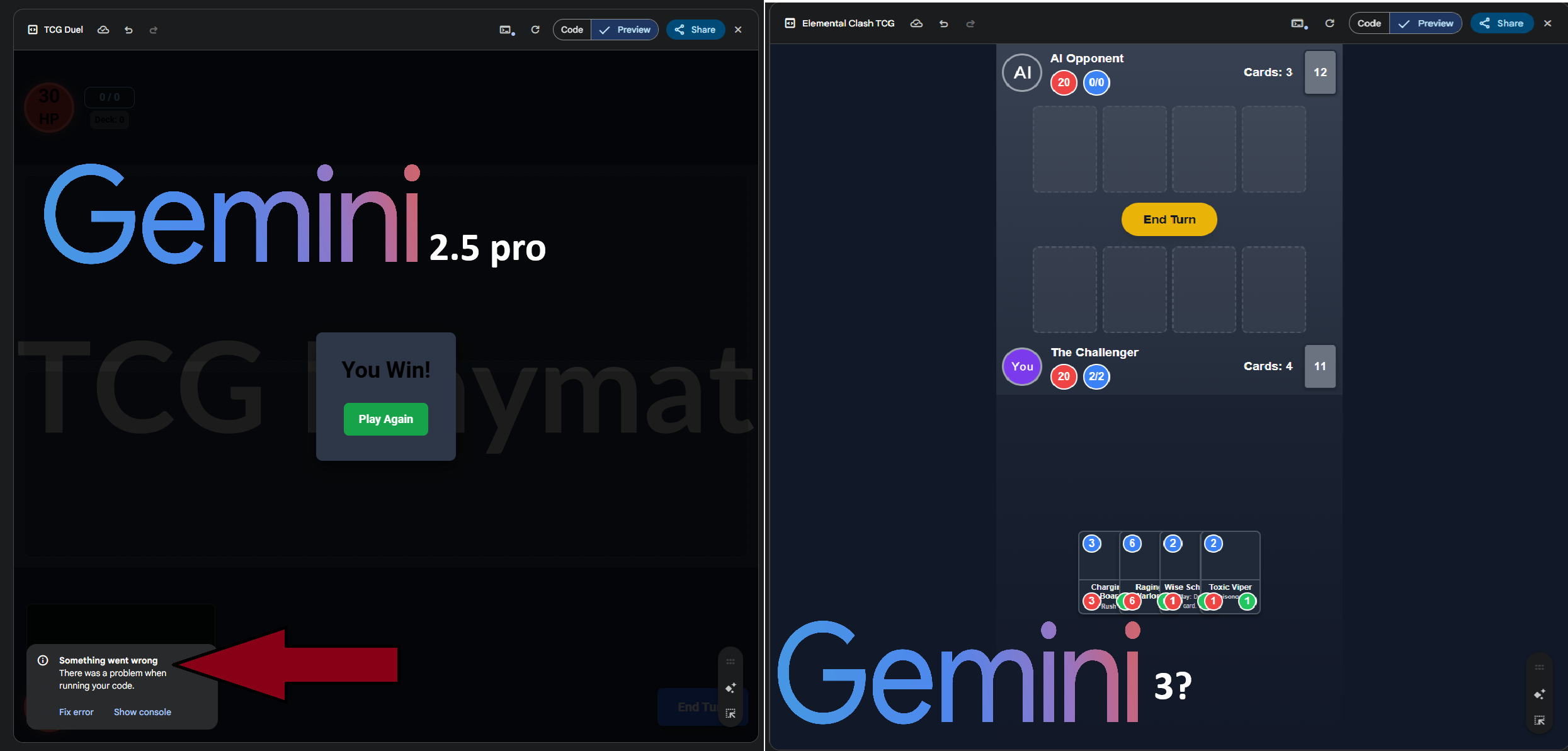Google Gemini 3: The Silent Game-Changer Poised to Reshape AI Development

The Quiet Revolution in AI-Powered Development
The AI development landscape may have just experienced a seismic shift that few noticed. Google appears to have silently released Gemini 3, introducing a revolutionary Canvas feature that transforms mobile devices into powerful development environments. This isn't just another incremental update—it's potentially a paradigm shift that threatens to disrupt the entire no-code and low-code development ecosystem.
Canvas: Turning Your Phone Into a Development Powerhouse
The new Canvas functionality represents a fundamental breakthrough in accessibility and ease of development. Users can now create fully functional applications directly on their mobile devices without requiring additional software or platforms. The process is remarkably streamlined:
- Select the Canvas feature within the Gemini app
- Input simple prompts describing your desired application
- Iterate and debug in real-time through conversational commands
- Deploy functional apps without traditional coding knowledge
This immediate, conversational approach to app development eliminates traditional barriers that have historically separated ideas from implementation.
The Death Knell for Traditional Coding Platforms?
The implications for established development platforms are staggering. Services like Lovable and Replit, which have built their business models around simplified coding experiences, now face an existential threat. The value proposition becomes increasingly difficult to justify when:
- Gemini subscriptions potentially include comprehensive development capabilities
- New Pixel phone purchases bundle these features
- The user experience appears superior on mobile devices
- Real-time debugging happens through natural language interaction
This shift raises fundamental questions about the sustainability of paid coding platforms when tech giants can integrate similar—or superior—functionality into their existing ecosystems.
Real-World Performance: Mobile Supremacy
Testing reveals a surprising performance disparity between mobile and web implementations. In practical demonstrations involving Trading Card Game (TCG) development:
Mobile Canvas Performance:
- Single prompt generated playable applications
- Quick layout adjustments for mobile optimization
- Successful feature integration (Taunt, Haste mechanics)
- Responsive debugging and iteration
Web-Based Gemini 2.5 Pro Performance:
- Multiple prompts failed to produce functional games
- Basic gameplay mechanics remained broken after extensive iteration
- Layout issues persisted across testing sessions
- Fundamental loading problems went unresolved
This performance gap suggests either the deployment of Gemini 3 on mobile platforms or significant optimization differences between mobile and web implementations.
Strategic Implications for Enterprise and Individual Users
The broader strategic implications extend far beyond individual app development:
For Businesses:
- Reduced dependency on specialized development teams
- Accelerated prototyping and MVP creation
- Lower barriers to digital transformation initiatives
- Potential cost savings on development tools and platforms
For Individual Creators:
- Democratized access to app development
- Immediate idea-to-implementation workflows
- Reduced learning curves for non-technical users
- Mobile-first development optimization
The Competitive Landscape Transformation
This development signals Google's aggressive push into the application development space, leveraging their AI capabilities to create vertical integration opportunities. The strategy effectively:
- Captures users within the Google ecosystem
- Reduces reliance on third-party development platforms
- Creates new revenue streams through enhanced subscription offerings
- Establishes mobile devices as primary development environments
Future Implications and Industry Response
The silent nature of this release suggests Google's confidence in the technology and their strategic approach to market disruption. As the technology matures, we can expect:
- Increased pressure on traditional no-code platforms to differentiate
- Potential consolidation within the simplified development space
- Enhanced mobile development capabilities across competing platforms
- Greater emphasis on AI-driven development workflows
The fundamental question facing the development community isn't whether AI will transform coding practices, but how quickly traditional platforms can adapt to remain relevant in an increasingly AI-native development landscape.
Conclusion: A New Era of Accessible Development
Whether this represents the official launch of Gemini 3 or advanced testing of enhanced capabilities, the implications are clear: we're witnessing the emergence of truly accessible, AI-powered development tools that could fundamentally reshape how applications are conceived, created, and deployed.
The superior mobile performance, combined with the seamless integration into existing Google services, positions this technology as a potential industry standard. For developers, businesses, and creative professionals, the message is unmistakable—the future of development is conversational, mobile-first, and increasingly democratized.
The only remaining question is whether competing platforms can innovate quickly enough to maintain relevance in this rapidly evolving landscape, or if Google's integrated approach will dominate the accessible development market entirely.
The Quiet Revolution in AI-Powered Development
The AI development landscape may have just experienced a seismic shift that few noticed. Google appears to have silently released Gemini 3, introducing a revolutionary Canvas feature that transforms mobile devices into powerful development environments. This isn't just another incremental update—it's potentially a paradigm shift that threatens to disrupt the entire no-code and low-code development ecosystem.
Canvas: Turning Your Phone Into a Development Powerhouse
The new Canvas functionality represents a fundamental breakthrough in accessibility and ease of development. Users can now create fully functional applications directly on their mobile devices without requiring additional software or platforms. The process is remarkably streamlined:
- Select the Canvas feature within the Gemini app
- Input simple prompts describing your desired application
- Iterate and debug in real-time through conversational commands
- Deploy functional apps without traditional coding knowledge
This immediate, conversational approach to app development eliminates traditional barriers that have historically separated ideas from implementation.
The Death Knell for Traditional Coding Platforms?
The implications for established development platforms are staggering. Services like Lovable and Replit, which have built their business models around simplified coding experiences, now face an existential threat. The value proposition becomes increasingly difficult to justify when:
- Gemini subscriptions potentially include comprehensive development capabilities
- New Pixel phone purchases bundle these features
- The user experience appears superior on mobile devices
- Real-time debugging happens through natural language interaction
This shift raises fundamental questions about the sustainability of paid coding platforms when tech giants can integrate similar—or superior—functionality into their existing ecosystems.
Real-World Performance: Mobile Supremacy
Testing reveals a surprising performance disparity between mobile and web implementations. In practical demonstrations involving Trading Card Game (TCG) development:
Mobile Canvas Performance:
- Single prompt generated playable applications
- Quick layout adjustments for mobile optimization
- Successful feature integration (Taunt, Haste mechanics)
- Responsive debugging and iteration
Web-Based Gemini 2.5 Pro Performance:
- Multiple prompts failed to produce functional games
- Basic gameplay mechanics remained broken after extensive iteration
- Layout issues persisted across testing sessions
- Fundamental loading problems went unresolved
This performance gap suggests either the deployment of Gemini 3 on mobile platforms or significant optimization differences between mobile and web implementations.
Strategic Implications for Enterprise and Individual Users
The broader strategic implications extend far beyond individual app development:
For Businesses:
- Reduced dependency on specialized development teams
- Accelerated prototyping and MVP creation
- Lower barriers to digital transformation initiatives
- Potential cost savings on development tools and platforms
For Individual Creators:
- Democratized access to app development
- Immediate idea-to-implementation workflows
- Reduced learning curves for non-technical users
- Mobile-first development optimization
The Competitive Landscape Transformation
This development signals Google's aggressive push into the application development space, leveraging their AI capabilities to create vertical integration opportunities. The strategy effectively:
- Captures users within the Google ecosystem
- Reduces reliance on third-party development platforms
- Creates new revenue streams through enhanced subscription offerings
- Establishes mobile devices as primary development environments
Future Implications and Industry Response
The silent nature of this release suggests Google's confidence in the technology and their strategic approach to market disruption. As the technology matures, we can expect:
- Increased pressure on traditional no-code platforms to differentiate
- Potential consolidation within the simplified development space
- Enhanced mobile development capabilities across competing platforms
- Greater emphasis on AI-driven development workflows
The fundamental question facing the development community isn't whether AI will transform coding practices, but how quickly traditional platforms can adapt to remain relevant in an increasingly AI-native development landscape.
Conclusion: A New Era of Accessible Development
Whether this represents the official launch of Gemini 3 or advanced testing of enhanced capabilities, the implications are clear: we're witnessing the emergence of truly accessible, AI-powered development tools that could fundamentally reshape how applications are conceived, created, and deployed.
The superior mobile performance, combined with the seamless integration into existing Google services, positions this technology as a potential industry standard. For developers, businesses, and creative professionals, the message is unmistakable—the future of development is conversational, mobile-first, and increasingly democratized.
The only remaining question is whether competing platforms can innovate quickly enough to maintain relevance in this rapidly evolving landscape, or if Google's integrated approach will dominate the accessible development market entirely.
Related Blog Posts


.jpg)